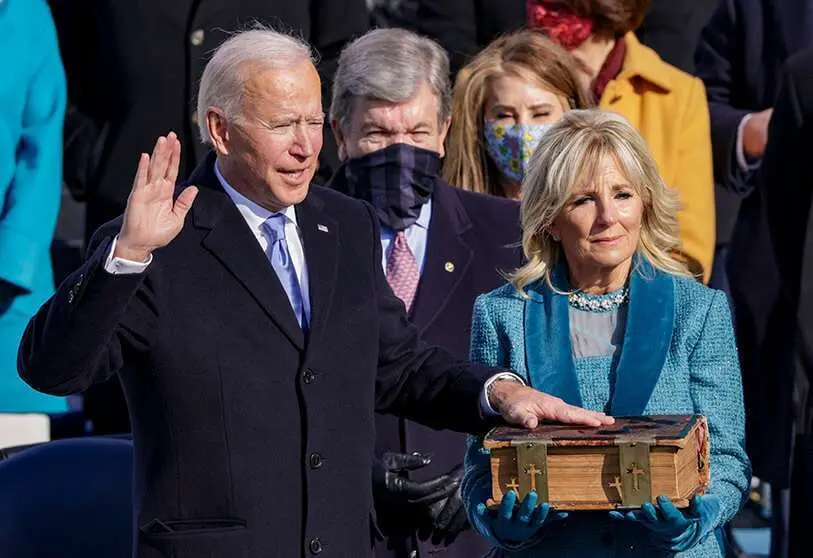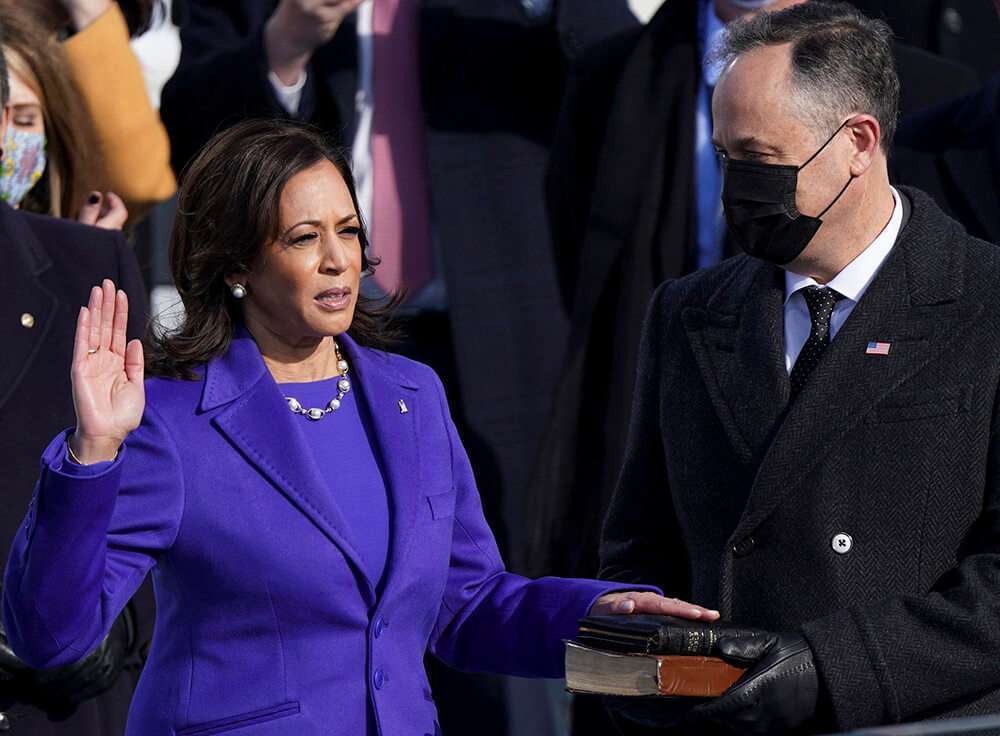Biden calls for unity in his inauguration as President of the United States

The day arrived for the investiture of the 46th president of the United States, Joseph R. Biden Jr. "This is America's day, the day of democracy", said the new American leader at the beginning of his speech. The speech was dominated by one word: unity; a clear allusion to the intention to overcome the turbulent past of the previous president, Donald Trump, which led to the sad episode of the assault on the Capitol.
Division and political tension dominated the past presidential term. Now the new Democratic Administration is seeking another path, that of unity, as Biden himself made clear at the parliamentary seat in Washington, where he stated that "democracy has prevailed".
"Today we celebrate the feast of democracy", Joe Biden said in his speech. We have learned that "democracy has prevailed", said the new president, who made it clear that the United States "is one nation, indivisible". "It is the nation that we can be and should be," he stressed.
Biden, 78, appealed to the "Constitution and the strength of the nation". "This is a great nation, we are a great people, although we have much to do," declared the new US leader, who acknowledged that the situation is the worst since World War II following the scourge of the coronavirus pandemic, which has left so many dead, and the resulting economic crisis, which has led to the loss of thousands of jobs.
Joe Biden called on every American to join his cause, which is to "fight violence, fear, racism and misunderstanding through the unity of all. "United by showing respect for each other," the Democratic Party leader explained.
The new US president, under the watchful eye of personalities present at the ceremony in Washington such as former president Barack Obama, defended democratic values, even if there are conflicting points of view or disagreements; for the Democratic leader, everyone has a place and this is part of American democracy. He also stressed the values of "opportunity, security, honour, justice and, definitively, truth".

The veteran politician acknowledged that there is concern about jobs, health (at this difficult stage of the COVID-19 pandemic) and other issues to be overcome, but called for "unity" in order to tackle all the problems that need to be tackled and continue to remain and prevail as a united nation. "We need each and every one of you to be winners in the face of all challenges," Biden said, noting that in the face of this pandemic, there must be one nation. "We will face this together," he said.
Joe Biden called for peace, progress and justice and recalled with great feeling the more than 400,000 Americans who had died from the COVID-19 pandemic. The Democratic president promised to "defend the Constitution, democracy and America" by giving "the best of himself".
Some 20,000 members of the National Guard ensured the security of Biden's inauguration, which was held practically in armoured form in view of the fear that incidents like the one that occurred on the Capitol could be repeated. The COVID-19 pandemic, to which Biden has also shown more commitment than Trump, made it necessary to hold the official ceremony without a general audience and with a reduced list of attendees. During the ceremony, Lady Gaga, who sang the US anthem, Jennifer Lopez and country singer Garth Brooks also spoke.

One of the most repeated concepts at Joe Biden's inauguration ceremony as President of the United States was that of unity. Following the tragic event of the assault on the Capitol a fortnight ago by radicalised followers of the now ex-president Donald Trump (who made the ugly gesture of not attending the swearing-in ceremony), it was decided to turn the page and most US citizens chose the Democratic candidate to open a new stage which is intended to be based on unity and the maintenance of democracy; this followed what was termed at the swearing-in ceremony as an "insurrection", in reference to the attack on the parliamentary seat in Washington.
The union of the American nation and the defence of the values of justice and freedom. These are the ideas that dominated the speeches made during Biden's inauguration ceremony. A new US president who wanted to confront the lie, an instrument used by his predecessor and many of his followers, who attempted to overturn the Democratic politician's election victory, although the courts ignored Trump's false accusations of election fraud.
Joe Biden has always argued that his work will be aimed at uniting a country that has been more polarised than ever by the controversy and aggressive policies of former Republican president Donald Trump, who had some successful episodes, such as the Abraham Agreements whereby various Arab countries established diplomatic ties with Israel, opening the way to pacifying the Middle East; but also many dark moments, which led to racial clashes, international disputes with other countries and various problems that converged in the terrible event of the attack on the US Congress. The seventieth-century US president appears to be a figure of consensus, widely voted for by citizens and not even arousing many misgivings in the opposition ranks of the Republican Party, which included many discordant voices opposed to Trump's figure.
After the political adventure with the outsider Trump, the Americans voted overwhelmingly for a candidate more closely linked to the institutional system, such as Joe Biden. More than 81 million people (an unprecedented number) backed Biden, who was running with the backing of more than three decades as a senator and eight years at the side of Barack Obama as vice president. He projects an image of stability and serenity which, in political terms, can surely come in handy after the tempestuous past.
Joe Biden's main political offer has been related to proclamations in favour of revoking many of Trump's initiatives; everything from a greater commitment to the environment to greater concern for immigration policy is on the new president's agenda. Issues to which the previous government did not pay particular attention. This also includes giving greater prominence to women in the new Biden Administration, with special mention here for the new US Vice President, Kamala Harris, the first woman to assume the presidency in the history of the United States (in addition to her racial origins, thus breaking with the greater white hegemony of past eras, particularly at that level).

In the next few hours, Joe Biden's new government is expected to enact a series of measures with which to distance itself from its predecessor in office, from the incorporation of the United States into the Paris Accords against climate change to the termination of the migratory veto on citizens of Muslim-majority countries. Also envisaged is the signing of the extension for repayment of loans to university students, the extension of the moratorium against evictions, and the compulsory wearing of masks in federal facilities and interstate travel, among other measures (it is worth recalling here how, in his day, Donald Trump came to frivolise and downplay the importance of the coronavirus pandemic, which has already claimed the lives of over two million people worldwide).

Biden is also expected to speak by telephone with several leaders from other countries to reposition the United States in the international concert. We will have to keep a close eye on relations with China following the technological and commercial struggle of recent years and on possible negotiations for Iran's return to the nuclear pact from which the Trump Administration withdrew in 2018 to impose political and economic sanctions on the Iranian state.
In the coming days, the now new US President will also ask his government to take measures to provide economic relief to working families hit by the current crisis.








